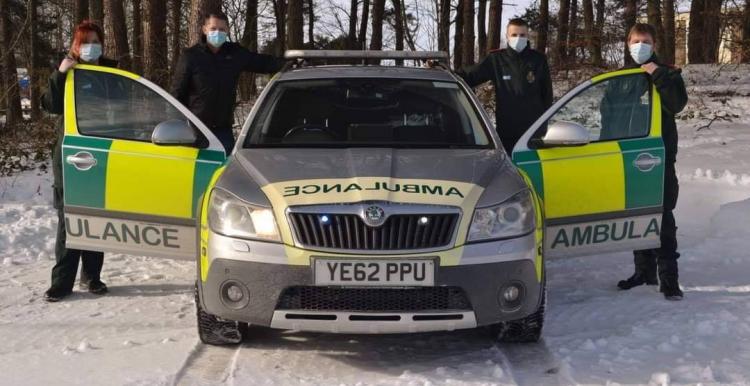Dedicated response car to provide mental health support in Durham and Darlington

North East Ambulance Service (NEAS) NHS Foundation Trust is working with Tees Esk and Wear Valleys (TEWV) NHS Foundation Trust, Durham and Darlington Street Triage Service to pilot a new mental health response car staffed by a paramedic and community psychiatric nurse, responding solely to patients who require further support after calling either 999 or NHS 111 for help.
The pilot, which runs until 31 March, aims to provide a faster response to patients in the Durham and Darlington area, delivering the most appropriate care for their needs.
The mental health response car will now be dispatched instead of an ambulance to patients who, after calling 999 or NHS111, are triaged as being urgent but not life-threatening.
Working as a team, the paramedic and community psychiatric nurse will be able to assess the patient and recommend appropriate treatment, either requesting a faster ambulance response or accessing care within the community, therefore reducing unnecessary hospital admissions.
This service was initially trialled for a six-week period during the first COVID lockdown and made a significant difference to patient care. Average response times were within 20 minutes and only 22 per cent of patients were taken to hospital.
The success of this next phase of the pilot will determine if long term funding can be made available.
The mental health response car is the latest dedicated service introduced by NEAS over recent years to improve its response to patients across the North East. It follows the success of the Trust’s dedicated falls response services and its specialist moving and handling evacuation service.
Stephen Down, mental health lead at NEAS, said: “We have been closely watching what our colleagues in other ambulance services are doing for some time, working behind the scenes to understand how different models operate in different parts of the country. Having done this research, we believe this model will suit our patients in the North East best.
“Whilst we will always try to reach patients as quickly as possible, these patients who need help but whose lives are not imminently in danger are often prioritised as urgent but not an emergency. As such, they may wait longer than we would like for help to arrive as our finite resources must concentrate on those in greater need.
“Once on scene, our ambulance crews may have to request further support for the crisis team, and often end up with no choice but to take the patient to A&E in order to keep them safe, which we know isn’t necessarily the best place for them.
“By working closer as a system, we think we can make better use of our resources, whilst providing more timely and appropriate care to our patients.
“We know from experience that many patients require specialist support in a community setting. Teaming a paramedic and a community psychiatric nurse means we should be able to meet the needs of that patient without sending an ambulance. However, the team may decide an ambulance is required and will be able to request a higher priority for that patient if required, for example, if the patient needs urgent physical care.
“The team will also be able to respond to requests from colleagues for specialist on-scene or telephone support where a double crewed ambulance has responded to a patient experiencing a mental health crisis.
“We’re excited about the potential for this service and hope to prove this is the way forward for patients experiencing a mental health crisis in the North East in order to secure funding for its long term future.”
Emma Burke, service manager at Tees, Esk and Wear Valleys NHS Foundation Trust, said: “We are proud to be partnering with our colleagues at NEAS once again, bringing mental health and ambulance services together to support the people of Durham and Darlington.
“Our mental health practitioners provide specialist knowledge ensuring patients, families and carers access the right service at the right time and receive an appropriate response tailored to their needs.
“More than half of the patients triaged face-to-face during last year’s pilot were assessed and remained at home with a plan and access to appropriate support numbers. Not only did this ease the pressure on A&E and free up ambulances to attend to other emergencies, but also enabled many people to be treated in a familiar, non-clinical environment.”
